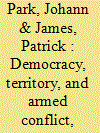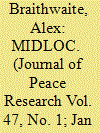|
|
|
Sort Order |
|
|
|
Items / Page
|
|
|
|
|
|
|
| Srl | Item |
| 1 |
ID:
151280


|
|
|
|
|
| Summary/Abstract |
This research note discusses a five-year examination of the original coding work of the Militarized Interstate Dispute (MID) project. After strictly applying MID coding rules, we recommend dropping 251 cases (or over 10% of the dataset), as either we were unable to find a militarized incident in the historical record or the dispute appeared elsewhere in the data. We found evidence linking 75 disputes to other cases, and we could not identify 19 cases in the historical record. Among the remaining disputes, we recommend major changes (changes in dispute year, fatality level, and participants) in 234 disputes and minor changes in 1,009 disputes. We use this article to examine the potential impact of our suggestions on existing studies. Though we identified several systematic problems with the original coding effort, we also find that these problems do not affect current understandings of what predicts the onset of interstate conflict. However, estimates in our replications of three recent studies of dispute escalation, dispute duration, and dispute reciprocation all witness substantial changes when using corrected data—to the point of reversing previous conclusions in some cases.
|
|
|
|
|
|
|
|
|
|
|
|
|
|
|
|
| 2 |
ID:
110813


|
|
|
|
|
| Publication |
2012.
|
| Summary/Abstract |
Growing interest in the social consequences of climate change has fueled speculation that global warming could lead to an increase in various forms of political violence. This article examines the effects of climate change on international conflict subsequent to the onset of European industrialization. Surprisingly, analysis at the system level suggests that global warming is associated with a reduction in interstate conflict. This naive relationship is suspect, however, as the increased consumption of carbon-based fuels is itself associated with changing patterns of politics and prosperity. In particular, economic development has been viewed as a cause of both climate change and interstate peace. Incorporating measures of development, democracy, cross-border trade, and international institutions reveals that systemic trends toward peace are actually best accounted for by the increase in average international income. The results imply that climate change, which poses a number of critical challenges for citizens and policymakers, need not be characterized as fundamentally a security issue, though climate change may have important security implications on the periphery of world politics. The analysis here also suggests that efforts to curb climate change should pay particular attention to encouraging clean development among middle-income states, as these countries are the most conflict prone. Ironically, stagnating economic development in middle-income states caused by efforts to combat climate change could actually realize fears of climate-induced warfare.
|
|
|
|
|
|
|
|
|
|
|
|
|
|
|
|
| 3 |
ID:
137821


|
|
|
|
|
| Summary/Abstract |
Democracy and territory are two of the most important factors that affect conflict and war. Yet no research design looks directly at a possible interaction between these two variables to influence occurrence of armed conflict. This study seeks to answer the following question: “How do two democracies behave when a contentious issue such as territory arises as the source of conflict between them?” Results based on Militarized Interstate Dispute data from 1920 to 1996 produce the conclusion that the pacifying effect of democracy stands up for both territorial dyads and non-territorial ones in spite of the imperatives toward militarization created by territorial conflict. However, territory of high salience still appears to increase the likelihood of armed conflict between two democracies.
|
|
|
|
|
|
|
|
|
|
|
|
|
|
|
|
| 4 |
ID:
093605


|
|
|
|
|
|
|
|